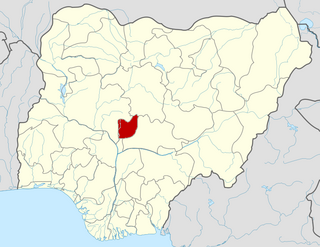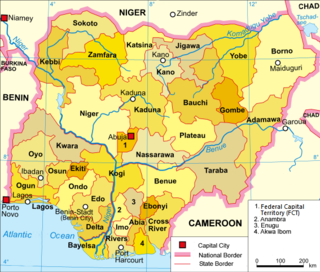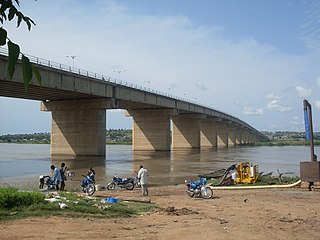Related Research Articles

Abuja is the capital city of the Federal Republic of Nigeria, strategically situated at the geographic midpoint of the country within the Federal Capital Territory (FCT). As the seat of the Federal Government of Nigeria, it hosts key national institutions, landmarks, and buildings spread across its over 50 districts. It replaced Lagos, the country's most populous city, as the capital on 12 December 1991.

The Federal Emergency Management Agency (FEMA) is an agency of the United States Department of Homeland Security (DHS), initially created under President Jimmy Carter by Presidential Reorganization Plan No. 3 of 1978 and implemented by two Executive Orders on April 1, 1979. The agency's primary purpose is to coordinate the response to a disaster that has occurred in the United States and that overwhelms the resources of local and state authorities. The governor of the state in which the disaster occurs must declare a state of emergency and formally request from the President that FEMA and the federal government respond to the disaster. The only exception to the state's gubernatorial declaration requirement occurs when an emergency or disaster takes place on federal property or to a federal asset—for example, the 1995 bombing of the Alfred P. Murrah Federal Building in Oklahoma City, Oklahoma, or the Space Shuttle Columbia in the 2003 return-flight disaster.

The Federal Capital Territory (FCT) is a federal territory in central Nigeria. Abuja, the capital city of Nigeria, is located in this territory. The FCT was formed in 1976 from parts of the states of old Kaduna, Kwara, Niger, and Plateau states, with the bulk of land mass carved out of Niger state. The Federal Capital Territory is within the North Central region of the country. Unlike other states of Nigeria, which are headed by elected Governors, it is administered by the Federal Capital Territory Administration, headed by a minister, who is appointed by the president.

Emergency management is a science and a system charged with creating the framework within which communities reduce vulnerability to hazards and cope with disasters. Emergency management, despite its name, does not actually focus on the management of emergencies; emergency management or disaster management can be understood as minor events with limited impacts and are managed through the day-to-day functions of a community. Instead, emergency management focuses on the management of disasters, which are events that produce more impacts than a community can handle on its own. The management of disasters tends to require some combination of activity from individuals and households, organizations, local, and/or higher levels of government. Although many different terminologies exist globally, the activities of emergency management can be generally categorized into preparedness, response, mitigation, and recovery, although other terms such as disaster risk reduction and prevention are also common. The outcome of emergency management is to prevent disasters and where this is not possible, to reduce their harmful impacts.

The United Nations Office for the Coordination of Humanitarian Affairs (OCHA) is a United Nations (UN) body established in December 1991 by the General Assembly to strengthen the international response to complex emergencies and natural disasters. It is the successor to the Office of the United Nations Disaster Relief Coordinator (UNDRO).
The National Response Plan (NRP) was a United States national plan to respond to emergencies such as natural disasters or terrorist attacks. It came into effect in December 2004, and was superseded by the National Response Framework on March 22, 2008.
Aliyu Modibbo Umar is a Nigerian technocrat who currently serves as the Special Adviser on General Duties to the Vice President of Nigeria, Kashim Shettima. He previously served as the federal Minister of State for Power and Steel from December 2002 to May 2003, Minister of Commerce from July 2006 to July 2007, then Minister for the FCT, a post he held until October 2008.

ReliefWeb (RW) is a humanitarian information portal founded in 1996. As of July 2023, it hosts more than one million humanitarian situation reports, press releases, evaluations, guidelines, assessments, maps and infographics. The portal is an independent source of information, designed specifically to assist the international humanitarian community in effective delivery of emergency assistance or relief. It provides information as humanitarian crises unfold, while emphasizing the coverage of "forgotten emergencies" at the same time.

The National Disaster Risk Reduction and Management Council (NDRRMC), formerly known as the National Disaster Coordinating Council (NDCC) until August 2011, is a working group of various government, non-government, civil sector and private sector organizations of the Government of the Republic of the Philippines established on June 11, 1978 by Presidential Decree 1566. It is administered by the Office of Civil Defense (OCD) under the Department of National Defense (DND). The council is responsible for ensuring the protection and welfare of the people during disasters or emergencies. The NDRRMC plans and leads the guiding activities in the field of communication, warning signals, emergency, transportation, evacuation, rescue, engineering, health and rehabilitation, public education and auxiliary services such as fire fighting and the police in the country. The Council utilizes the UN Cluster Approach in disaster management. It is the country's focal for the ASEAN Agreement on Disaster Management and Emergency Response (AADMER) and many other related international commitments.

UN-SPIDER is a platform which facilitates the use of space-based technologies for disaster management and emergency response. It is a programme under the auspices of the United Nations Office for Outer Space Affairs (UNOOSA).
The Stephenson Disaster Management Institute at Louisiana State University is located in the Stephenson National Center for Security Research and Training at LSU.
Many countries around the world have civil defense organizations dedicated to protecting civilians from military attacks and providing rescue services after widespread disasters. In most countries, civil defense is a government-managed and often volunteer-staffed organization.

The 2012 Nigeria floods began in early July 2012. It killed 363 people and displaced over 2.1 million people as of 5 November 2012. According to the National Emergency Management Agency (NEMA), 30 of Nigeria's 36 states were affected by the floods and the two most affected areas were Kogi and Benue States. The floods were termed as the worst in 40 years, and affected an estimated total of seven million people. The estimated damages and losses caused by the floods was N2.6 trillion.
The Society for Family Health (SFH) is a pan-African non governmental organisation (NGO), founded in 1983 and incorporated in 1985.
Lugbe, Abuja is a residential district and town in Abuja. The town covers approximately 50 km2. The community is a countryside settlement expanding on the urban fringe of Abuja. The area is site to a Voice of Nigeria Transmission Station (VNT), FHA Estate and the National Space Development and Research Agency.

Natural disasters in Nigeria are mainly related to the climate of Nigeria, which has been reported to cause loss of lives and properties. A natural disaster might be caused by flooding, landslides, and insect infestation, among others. To be classified as a disaster, there is needs to be a profound environmental effect or human loss which must lead to financial loss. This occurrence has become an issue of concern, threatening large populations living in diverse environments in recent years.
The National Senior Citizens Act, 2018 is an act which was passed by the Federal Government of Nigeria to cater for the needs of the senior citizens. The act was signed into law by President Muhammadu Buhari and led to the establishment of the National Senior Citizens Centre in Nigeria to cater for the needs of the senior citizens. The National Senior Citizens Centre is domiciled with the Federal Ministry of Humanitarian Affairs, Disaster Management and Social Development.

The 2022 Adamawa State flood was a natural disaster that occurred in Adamawa State, Nigeria, in September 2022. It affected over 30,000 square kilometers of land and exposed about 6.6 million people to potential risks. The flood was caused by heavy rainfall and increased water flows from the Cameroonian highlands. It resulted in 25 deaths, 58 injuries, and the displacement of 131,638 people. It also submerged 153 communities and damaged houses, farmlands and other properties. The flood highlighted the vulnerability of the region to such events and the need for better preparedness and mitigation measures.

Starting in March 2023, Nigeria experienced a series of flooding events that led to nationwide disruptions, but with concentrated economic effects in southern Nigeria. The increased flood season was first predicted by a seasonal report in January 2023 by the Nigerian Meteorological Agency (NiMet) predicted an early commencement of rain. Following the unusual flooding season, the National Emergency Management Agency said in October that more than 33,000 people nationwide were impacted by the flood disaster.

Zubaida Umar Abubakar is a Nigerian public servant, administrator, and Director General of the National Emergency Management Agency (NEMA), appointed on March 15, 2024, by President Bola Ahmed Tinubu. She is a native of Birnin Kebbi in Kebbi State in the Northern part of Nigeria.
References
- 1 2 "NEMA, NOA and Emergency Management – Nigeria". ReliefWeb. 11 September 2013. Retrieved 2 October 2021.
- ↑ Mashi, Sani Abubakar; Oghenejabor, Obaro Dominic; Inkani, Amina Ibrahim (February 2019). "Disaster risks and management policies and practices in Nigeria: A critical appraisal of the National Emergency Management Agency Act". International Journal of Disaster Risk Reduction. 33: 253–265. Bibcode:2019IJDRR..33..253M. doi:10.1016/j.ijdrr.2018.10.011. S2CID 169971718.
- ↑ OYOYO, IGHO (26 September 2021). "Trademore Disaster: A Cue To Avert Future Flooding Within The FCT". Leadership News – Nigeria News, Breaking News, Politics and more. Retrieved 2 October 2021.
- ↑ "Tinubu appoints Zubaida Umar NEMA DG - Daily Trust". dailytrust.com. 15 March 2024. Retrieved 12 November 2024.
- ↑ "Nigeria: NEMA appeals to States to establish disaster agencies – Nigeria". ReliefWeb. 30 July 2009. Retrieved 2 October 2021.
- ↑ "10 States, FCT Lack Emergency Management Agencies". Nigeria A-Z Online. 26 September 2011. Retrieved 2 October 2021.